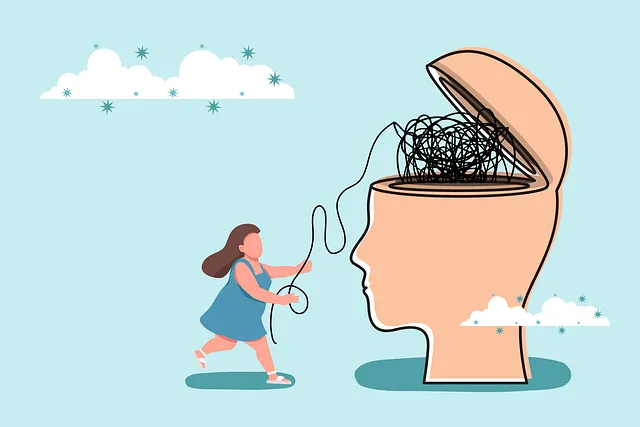The Kaiser Permanente behavioral health center in Louisville prioritizes group facilitation as a core strategy for community healing and mental wellness support. Trained facilitators create safe, supportive environments using evidence-based practices like Mind Over Matter and Self-Awareness Exercises. Key techniques include active listening, empathy, open communication, and cultural competency. Success is measured through participant feedback, attendance tracking, and pre-post mental health assessments, allowing for continuous improvement and enhanced self-esteem improvement among all participants.
Mental wellness group facilitation plays a pivotal role in enhancing individual well-being, and the Kaiser Permanente Behavioral Health Center Louisville stands as a beacon of hope, offering innovative techniques in this realm. This article delves into the art of facilitating mental health groups at the center, exploring key strategies for success. From creating safe spaces to measuring progress, we uncover essential practices that foster positive outcomes, all while highlighting the unique approach of Kaiser Permanente Behavioral Health Center Louisville.
- Understanding Mental Wellness Group Facilitation at Kaiser Permanente Behavioral Health Center Louisville
- Key Techniques for Effective Group Facilitation
- Creating a Safe and Supportive Environment in Therapy Groups
- Measuring Success and Promoting Continuous Improvement
Understanding Mental Wellness Group Facilitation at Kaiser Permanente Behavioral Health Center Louisville

At Kaiser Permanente Behavioral Health Center Louisville, mental wellness group facilitation takes center stage as a powerful tool for community healing and growth. This approach recognizes the strength found in shared experiences and offers a supportive environment where individuals can connect, learn, and heal together. Facilitators at the center are trained to guide participants through evidence-based practices, such as Mind Over Matter principles, which empower them to navigate life’s challenges with resilience.
The process involves fostering emotional healing through various techniques, including Self-Awareness Exercises designed to help individuals understand their thoughts and emotions. This holistic approach ensures that members of the community receive comprehensive support tailored to their unique journeys. By embracing these group facilitation techniques, Kaiser Permanente Behavioral Health Center Louisville continues its mission to promote mental well-being and foster a sense of belonging among those seeking support.
Key Techniques for Effective Group Facilitation

Effective group facilitation is a critical skill for mental wellness support at centers like the Kaiser Permanente behavioral health center in Louisville. Key techniques include active listening, fostering an inclusive environment, and promoting open communication. Facilitators should encourage all participants to share their experiences and perspectives, ensuring no one voice dominates. This creates a safe space where individuals feel comfortable expressing their thoughts and emotions freely.
Additionally, incorporating evidence-based practices like Compassion Cultivation Practices and Burnout Prevention Strategies for Healthcare Providers can enhance the group’s impact. These techniques not only foster empathy and understanding among members but also teach valuable coping skills (Coping Skills Development). By integrating these strategies, facilitators enable participants to build resilience and navigate challenges with greater equanimity, ultimately contributing to improved mental wellness outcomes.
Creating a Safe and Supportive Environment in Therapy Groups

Creating a safe and supportive environment is paramount for effective group therapy sessions at Kaiser Permanente behavioral health center Louisville. This involves fostering an atmosphere where every participant feels heard, respected, and valued. Group facilitators play a crucial role in setting the tone through active listening, empathy, and non-judgmental attitudes. Encouraging open dialogue and ensuring confidentiality are essential steps to build trust among members. Incorporating techniques like reflective listening and validation helps individuals express their thoughts and emotions freely.
Additionally, cultural competency training for healthcare providers is integral to addressing diverse needs within the group. This enables facilitators to recognize and appreciate unique backgrounds, beliefs, and experiences, tailoring interventions accordingly. Social skills training and self-esteem improvement activities can further enhance group dynamics, promoting positive interactions and a sense of belonging. Such initiatives collectively contribute to creating an inclusive setting where mental wellness journeys can flourish.
Measuring Success and Promoting Continuous Improvement

Measuring success is a critical aspect of group facilitation, especially at centers like the Kaiser Permanente behavioral health center in Louisville. Facilitators should employ qualitative and quantitative methods to assess the impact of their programs. This includes collecting feedback from participants through surveys or interviews, tracking attendance rates, and evaluating changes in mental health symptoms before and after the sessions. By analyzing these data points, facilitators can identify what’s working and what needs improvement, ensuring the group’s effectiveness over time.
Promoting continuous improvement requires a commitment to ongoing reflection and adaptation. Facilitators should encourage open communication among group members, allowing them to share their experiences and suggestions. Incorporating Self-Awareness Exercises and Stress Management techniques into group dynamics can enhance these discussions. Additionally, regularly reviewing and updating the program curriculum based on feedback and emerging research in mental health can contribute to better outcomes, fostering an environment that supports Self-Esteem Improvement for all participants.
Mental wellness group facilitation plays a pivotal role in enhancing the well-being of individuals at the Kaiser Permanente Behavioral Health Center Louisville. By understanding the unique dynamics of group therapy, facilitators can employ key techniques to create safe and supportive environments. Continuous improvement, measured through effective assessment methods, ensures that these groups remain beneficial and impactful. The strategies outlined here empower professionals to facilitate transformative experiences, ultimately contributing to positive mental health outcomes for participants at the Kaiser Permanente Behavioral Health Center Louisville.






